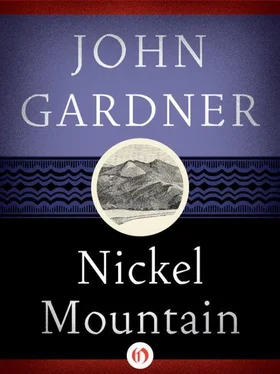The fog lay all around the house now, sealing it up like a box. At every window he saw his own reflection, but when he let his mind wander he was aware of the others; it was as if he could hear them breathing: Simon just on the other side of that door straight in front of him, Callie and Jimmy just up the stairs that opened onto the kitchen to his right. Outside, nothing moving. A hundred thousand birds would start singing when the sun came up, and in the valley cows would move in from their pastures toward lighted barns. In the fields, mice, woodchucks, rabbits, dogs would run, when dawn came, and the mountainsides would be rife with wild things, from squirrels to foxes — but just now, nothing. But no, that was wrong of course. Fog or no fog, everything was the same as always, animals stalking animals stalking animals in deadly procession, quiet as dreams.
She’d had plans for that money. He’d never agreed to Callie’s plans, but it was settled between them that one of these days they would have it out; he’d had no right to spend six hundred dollars on something insane. Unless maybe that was why he’d done it: not for Simon’s wife but against his own.
(He remembered vividly the way cows would push at the fences on his grandfather’s farm. Even if you pastured them in clover and the other side was barely stubble, still they’d push to get out. He and his father and grandfather would go out in the middle of the night — two fat old men and a fat little boy — and they’d shout at the cows and turn them around with pitchfork handles, and the cows would go anywhere on earth but where you wanted them. When you finally got them to the open gate or the hole in the fence, you had to twist their tails to run them through.)
But that wasn’t all of it. He remembered the way Callie had reached out, finally, and touched Simon Bale when he was crying.
The thought was comforting for a minute, but the next minute he wondered if he would have brought Simon here at all if it weren’t for the others who’d stood above him doing nothing. There was a story about two old brothers named Sprague — a true story, Jim Millet said. They’d lived together in Slater all their lives, and when they were eighty they’d sold their house and moved down to Florida. Nobody knew them there, and the second day one of them killed the other with an axe, just like that, nobody ever learned why. It would never have happened if they’d stayed where they belonged, Jim Millet said. The man had never done a thing to cover up his crime. He’d carried the body to the garage and shut it up, and as soon as it started to smell, the neighbors found it.
The story was puzzling, and Henry leaned on his fists, frowning. He was still thinking about it when he dozed off. When he woke up again — he couldn’t tell how much later — Simon Bale was standing over by the stove, blinking. He had on only his suitcoat and trousers, no shirt or undershirt, no shoes.
“Trouble sleeping?” Henry said.
Simon waved as if to say it was unimportant.
Henry squinted at him, wide awake now, and it was as if, seeing him here in his own kitchen where every pot and pan had its precise meaning, he was seeing Simon clear for the first time. It was like something that came to you early in the morning when you’d first gotten up: Compared to Callie’s light blue apron, not a brute object but the sum of its associations, Simon Bale was old and sallow-faced and strangely bitter, maybe devious. Against the yellow of the walls he was tortuously old-fashioned, grim, as rigid as an angle iron. It made Henry’s skin creep.
Simon stood with his big-knuckled hands at his sides, his belly out, chest caved in, head forward, looking at the coffeepot on the stove. He lifted the lid, saw that the pot was empty, and replaced the lid as if that too were of no importance. He came over and stood with his hands in his side pockets, looking disapprovingly at Henry’s ledger. After a moment he drew out a chair, smiled apologetically, then looked grim again, and sat down.
“The house gets cold, these foggy nights,” Henry said.
Simon nodded and smiled.
For a long time after that neither of them spoke. Henry thought of mentioning the funeral, then thought better of it. Not mentioning it was pure cowardice, he knew: To tell Simon would be, in effect, to tell Callie. But Simon was completely uninterested in her burial, or so he said; as likely as not, he wouldn’t even bother to go when Henry did tell him.
The muscles of Simon’s face were working, and he had his eyes fixed on Henry’s forehead. After a moment, with a darting motion, he drew a stack of small, white leaflets from his inside coatpocket. He leered and slid them across the table toward Henry, watch and wait! the top one said. The next said, who shall be saved? Under the title there were words in italics: But why dost thou judge thy brother? or why dost thou set at nought thy brother? for we shall all stand before the judgment seat of Christ. (Rom. 14:10) It was not what Henry would have expected; he would have expected, well, something about God’s wrath, say, or the seven angels of doom. “Is this what Jehovah’s Witnesses believe?” Henry said.
However mild the text, there was a spark of anger in Simon’s eyes. “Not what we believe,” he said, “the truth!”
“Yes, of course,” Henry said, looking down.
“Do you dare to deny the Judgment of the Lord?” Simon said. He was leaning forward now, his lower lip trembling. His fury seemed to Henry inexplicable, unwarranted by anything Henry had said.
“I don’t deny anything,” Henry said.
“But there is evil,” Simon said. “Woe to that man—”
“Perhaps so,” Henry said sharply, cutting him off.
Simon looked at him for a long time, then at last bowed his head. “You have been kind to me, within the bounds of your understanding.” After another moment: “I am deeply grateful. May the Lord keep you, Mr. — ” He seemed to cast about for Henry’s name.
Henry winced, watching him closely, at once repelled and fascinated, like a man watching a rattlesnake behind glass.
“I accept your hospitality,” Simon said, suddenly smiling grotesquely, tears in his eyes. “God’s will be done.”
The troopers came in the next afternoon and casually asked to speak with Simon. Behind the counter, Henry Soames stood thinking a moment, the lenses of his glasses blanking out his eyes. “I’ll see if I can locate him,” he said. He rubbed the side of his nose, still thinking, and then, reluctantly, he left the diner to look.
He was a little on edge to start with, as he frequently was when Callie’s mother decided to come down and help out. She’d been here most of the day again, busying herself when there was nothing to do, mopping the floor when it was perfectly all right, bending the old gray spoons back into shape, criticizing the electric potato peeler for eating up three-fourths of every potato. He wished she’d get down to what she’d come here to say, but she didn’t, and gradually Henry was beginning to believe she had no intention of getting down to it. Maybe she figured she would drive out Simon Bale by just hanging around. Well, she figured wrong. When Henry asked her, “You seen Simon, Ellie?” she had looked surprised, as if she hadn’t heard what the troopers had said, five feet from where she’d been careful to be standing, and she’d said, “Why, no, Henry, I been too busy. Does somebody want him?” Henry had nodded and hurried on by her.
Simon wasn’t in the garden, this time, and when Henry called into the house he found he wasn’t there either. “Why do you want him?” Callie called back, but Henry ignored her too. He started for the garage.
Читать дальше











